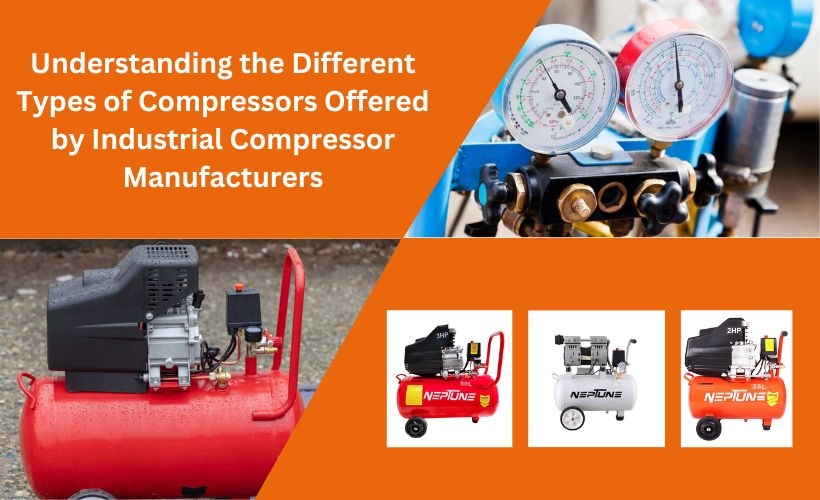Compressors are critical in various industrial processes, from manufacturing to energy production. They are used to increase the pressure of gases, allowing them to perform tasks efficiently and reliably. With technological advancements, Industrial compressor manufacturers or air compressor suppliers offer several types of compressors, each tailored to specific applications. In this blog post, we will explore the most common types of compressors and their key features, helping you make informed decisions when selecting the right one for your needs.
Reciprocating Compressors
Reciprocating compressors are widely used in industrial settings due to their versatility and efficiency. Industrial compressor manufacturers use a piston to compress gas within a cylinder, making them suitable for a wide range of pressures and flow rates. They are often found in manufacturing plants, refrigeration units, and air conditioning systems.
Types of Reciprocating Compressors:
Single-stage: Best suited for lower-pressure applications, these compressors compress the gas in a single step.
Multi-stage: Designed for higher pressure requirements, these compressors compress the gas in multiple stages, offering greater efficiency for demanding tasks.
Horizontal: These compressors are typically used in larger industrial facilities where space is available.
Vertical: More compact, vertical reciprocating compressors are ideal for smaller installations where space is limited.
Rotary Screw Compressors
Rotary screw compressors are another popular option, especially in industries where continuous operation is required. These compressors use two intermeshing screws to compress gas, offering high efficiency and low noise levels. They are widely used in manufacturing, oil and gas, and food processing industries due to their reliability and ease of maintenance.
Types of Rotary Screw Compressors:
Oil-flooded: These compressors use oil for lubrication and cooling, ensuring smooth operation and longevity.
Oil-free: Oil-free compressors are the ideal choice for applications where contamination must be avoided. They are commonly used in food processing, pharmaceuticals, and electronics manufacturing.
Centrifugal Compressors
Centrifugal compressors use centrifugal force to increase gas pressure, making them ideal for high-volume, low-pressure applications. These compressors are commonly used in power plants, refineries, and the petrochemical industry where large volumes of gas need to be compressed efficiently.
Types of Centrifugal Compressors:
Radial flow: In this type, gas flows radially outward from the impeller, making it suitable for applications with high flow rates.
Axial flow: Gas flows axially through the compressor, typically used in high-speed, high-volume operations such as jet engines and large power plants.
Scroll Compressors
Known for their quiet operation and high efficiency, scroll compressors use two intermeshing scroll elements to compress gas. They are often used in air conditioning systems, medical equipment, and pneumatic tools. Scroll compressors offer a compact design and are energy-efficient, making them a popular choice in industries where space and noise are concerns.
Choosing the Right Compressor
Selecting the right compressor for your industrial application is crucial to ensure efficiency, performance, and cost-effectiveness. Several factors should be considered:
Pressure Requirements: Determine the pressure level needed for your application. Higher-pressure tasks may require multi-stage reciprocating compressors, while low-pressure applications may benefit from centrifugal compressors.
Flow Rate: The volume of gas to be compressed influences the compressor’s capacity. High-volume applications may require centrifugal compressors, while smaller tasks can be handled by scroll or rotary screw compressors.
Application Type: The specific industry or process you’re working with will dictate the compressor type. For example, oil-free rotary screw compressors are suitable for food and pharmaceutical industries, while oil-flooded compressors may be more suited for general manufacturing.
Efficiency: Energy efficiency is a key consideration in minimizing operating costs. Compressors like rotary screws and scroll types are known for their energy-efficient designs.
Maintenance Needs: Consider the long-term maintenance requirements, including the availability of spare parts and the frequency of servicing.
Noise Levels: If noise reduction is a priority in your facility, scroll and rotary screw compressors are generally quieter and may be the best choice.
If you’re looking to buy air compressor, understanding these factors will guide you to make a well-informed decision.
Conclusion
Industrial compressor manufacturers offer a wide array of compressor types, each with its unique set of advantages and limitations. Understanding the differences between reciprocating, rotary screw, centrifugal, and scroll compressors will help you choose the right equipment for your specific industrial application. By carefully evaluating your pressure requirements, flow rate, application, and other factors, you can ensure optimal performance and efficiency from your compressor system.
Whether you need a high-pressure, continuous operation, or oil-free options, there’s a compressor out there that fits your needs. Make an informed choice, and your industrial operations will benefit from increased productivity, reduced costs, and reliable performance.
For those searching for air compressor suppliers, a thorough comparison of products and features will help you find the best fit for your industrial requirements.
FAQs
Q1. What is the best type of compressor for industrial use?
It depends on the application. For continuous operation, rotary screw compressors are often the best, while reciprocating compressors are ideal for high-pressure tasks.
Q2. How do I determine the right compressor for my application?
Consider factors like pressure requirements, flow rate, and type of industry to ensure the compressor fits your needs.
Q3. Are oil-free compressors better for food processing?
Yes, oil-free compressors are the preferred choice for food processing and pharmaceutical industries to avoid contamination.
Q4. How often should compressors be maintained?
Maintenance schedules vary by compressor type, but regular servicing is crucial for optimal performance. Rotary screw compressors may require less frequent maintenance compared to reciprocating compressors.
Q5. What are the signs that a compressor needs to be replaced?
Increased noise levels, reduced efficiency, and frequent breakdowns are indicators that it might be time to replace your compressor.




